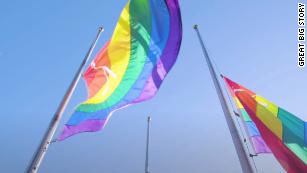Supreme Court Delivers Major Victory To LGBTQ Employees
Federal civil rights law protects gay, lesbian and transgender workers, the Supreme Court ruled Monday.
The landmark ruling will extend protections to millions of workers nationwide and is a defeat for the Trump administration, which argued that Title VII of the Civil Rights Act that bars discrimination based on sex did not extend to claims of gender identity and sexual orientation.
The 6-3 opinion was written by Justice Neil Gorsuch and joined by Chief Justice John Roberts and the court's four liberal justices.
"An employer who fires an individual for being homosexual or transgender fires that person for traits or actions it would not have questioned in members of a different sex. Sex plays a necessary and undisguisable role in the decision, exactly what Title VII forbids," Gorsuch wrote.
"There is simply no escaping the role intent plays here: Just as sex is necessarily a but-for cause when an employer discriminates against homosexual or transgender employees, an employer who discriminates on these grounds inescapably intends to rely on sex in its decisionmaking," the opinion read.
"Today's decision is one of the court's most significant rulings ever with respect to the civil rights of gay and transgender individuals," said Steve Vladeck, CNN Supreme Court analyst and professor at the University of Texas School of Law.
"On its terms, the decision is only about discrimination in the workplace," Vladeck added. "But it inevitably opens the door to a host of other challenges to discrimination on the basis of sexual orientation or transgender status on the ground that it, too, is impermissibly based upon sex. In that respect, only the court's 2015 ruling recognizing a constitutional right to same-sex marriage may be equally as significant."
The LGBTQ community is made of up of approximately 1 million workers who identify as transgender and 7.1 million lesbian, gay and bisexual workers, according to UCLA's Williams Institute.
Twenty-two states, plus the District of Columbia have statutes protecting workers based on sexual orientation, according to the Williams Institute. Twenty-one states plus DC have statutes protecting workers from discrimination based on gender identity.
Justice Samuel Alito, one of the court's conservatives, wrote in his dissent that "even if discrimination based on sexual orientation or gender identity could be squeezed into some arcane understanding of sex discrimination, the context in which Title VII was enacted would tell us that this is not what the statute's terms were understood to mean at that time."
Meanwhile, Justice Brett Kavanaugh, another conservative on the bench, acknowledged the social and political progress achieved by members of the LGBTQ community, but nonetheless dissented.
"They have advanced powerful policy arguments and can take pride in today's result. Under the Constitution's separation of powers, however, I believe that it was Congress's role, not this Court's, to amend Title VII. I therefore must respectfully dissent from the Court's judgment," Kavanaugh wrote.
A number of LGBTQ groups celebrated the court's ruling on Monday, including the Human Rights Campaign, whose president, Alphonso David, said in a tweet that the decision is a "landmark victory for #LGBTQ equality."
Sarah Kate Ellis, the president of the LGBTQ advocacy group GLAAD, said in a statement that the decision "is a step towards affirming the dignity of transgender people, and all LGBTQ people."
Presumptive Democratic presidential nominee Joe Biden called the ruling "a momentous step forward for our country."
Open Comments
Close Comments


Post a Comment for "Supreme Court Delivers Major Victory To LGBTQ Employees"